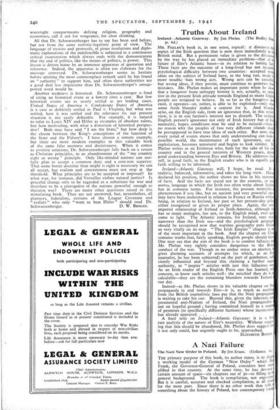Truths About Ireland
Mat. PHELAN'S book is, in one sense, topical: it discusses aspect of the Irish question that is now most immediately in British mind. But a permanent value is given to the discuss. by the way he has placed an immediate problem—that of future of Eire's Atlantic bases—in its relation to lasting fa These facts are the outcome of a long-lived but not incurs psychological difficulty between two countries: accepted wr ideas on the subject of Ireland have, in the long run, made f more trouble 'han wrong acts. Wrong acts can be cancel but wrong ideas, if they persist, must continue to generate fr mistakes. Mr. Phelan makes an important point when he sh that a hangover from unhappy history is not, actually, as ope tive in the present Irish attitude towards England as many En people are resigned to believe. In so far as the hangover exist, it operates—or, rather, is able to be exploited—only w some fresh blunder makes a context for it. And blund arise, on the English side, from an ignorance that, in this wri view, it is in one faction's interest not to disturb. The ordi English person's ignorance not only of Irish history but of It mentality, hopes, conditions may be said to be natural—there no reason why the peoples of two very different islands sho be presupposed to have true ideas of each other. But now, w every trend of events shows that only understanding can make possible world, the maintenance of such ignorance, and exploitation, becomes unnatural and begins to look sinister. Ii Phelan writes as an Irishman who, both for the sake of his o country and in the general interests of Western peace, des' good understanding between Eire and Britain. He addresses h self, in good faith, to the English reader who is in equally g faith willing to be informed.
Ireland—Atlantic Gateway will, I hope, be read. It realistic, balanced, informative, and takes the long view. Ha declared his position, the author shows no bias in his statem of facts. And the facts are stated not in the esoteric, or n autres, language in which the Irish too often write about Ire but in common terms. For instance, the peasant mentality phenomenon if you like, but an ancient and very powerful on may have been understood in relation to France or Russia wi being, in relation to Ireland, her past or her present-day poll either recognised or given its proper place. Again, the s imperial relationship of Ireland to Irish-America, although has so many analogies, has not, to the English mind, ever q come to light. The Atlantic remains, for Ireland, very m narrower than the Irish sea—and the psychological geograp should be recognised now that wartime geography puts Irel so very vitally on its map. " The Irish Empire " chapter is of the most important in the book. And the chapter on Uls contains truths that, fairly speaking, English people should kno One may say that the aim of the book is to combat fallacies Mr. Phelan very rightly considers dangerous to the Brits, conduct of the war. Though in no undue sense an alarmist,: gives alarming accounts of attempts (to which, as an Jr., journalist, he has been subjected) on the part of gentlemen, suff ciently influential and beyond this claiming a further augu authority, to " inspire " articles with just this fallacious no: As an Irish reader of the English Press one has learned, IN' concern, to know such articles well: the mischief they do is 5 calculable—they are the remaining blunders towards Ireland our day.
Indeed—as Mr. Phelan shows in his valuable chapter on N propaganda in and towards Eire—it is, as much as anyth from the British journalistic faux pas that the Nazi propaga is waiting to take his cue. Beyond this, given the inherent, peramental anti-Nazism of Ireland, the Nazi propagandist not on hopeful ground ; having committed himself to a num of promises (to specifically different factions) whose inconsisten has already appeared. . . . A final note on Ireland—Atlantic Gateway: it is a fi rate analysis of the nature of Eire's neutrality. Without sugg ing that this should be abandoned, Mr. Phelan does suggest h it not only could, but urgently ought to be, approached.
ELIZABETH BOWEN.


























 Previous page
Previous page